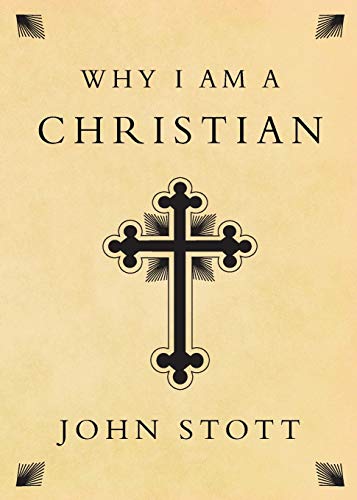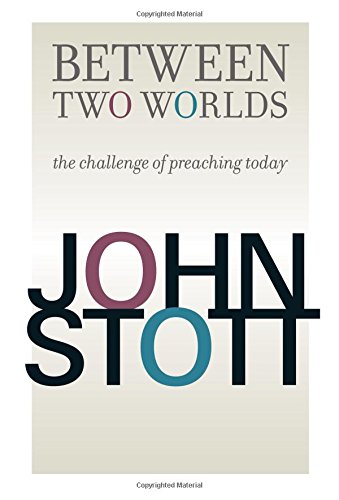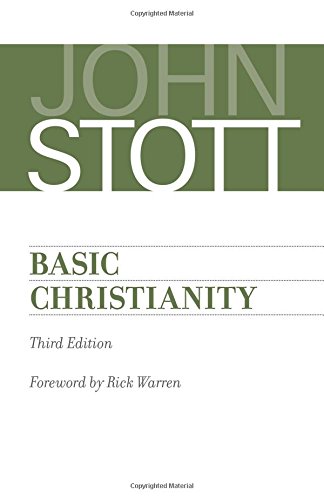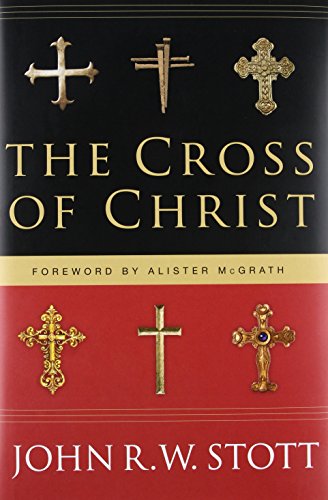
Quotes by John Stott
God must speak to us before we have any liberty to speak to Him. He must disclose to us who He is before we can offer Him what we are in acceptable worship. The worship of God is always a response to the Word of God. Scripture wonderfully directs and enriches our worship.
The Contemporary Christian: Applying God’s word to Today’s World, InterVarsity Press, 1995, p. 174.
A Christian’s freedom from anxiety is not due to some guaranteed freedom from trouble, but to the folly of worry…and especially to the confidence that God is our Father, that even permitted suffering is within the orbit of His care.
Nothing seals the lips and ties the tongue like the poverty of our own spiritual experience. We say nothing because we have nothing to say.
Romans – God’s Good News for the World, 1994, InterVarsity Christian Fellowship/USA. Used with permission of InterVarsity Press, P.O. Box 1400, Downers Grove, IL 60515. www.ivpress.com.
All worry is about tomorrow, whether about food or clothing or anything else; but all worry is experienced today. Whenever we are anxious, we are upset in the present time about some event which may happen in the future. However, these fears of ours about tomorrow, which we feel so acutely today, may not be fulfilled. The popular advice, "Don’t worry, it may never happen," is doubtless unsympathetic, but perfectly true. People worry that they may not pass an exam, or find a job, or get married, or retain their health, or succeed in some enterprise. But it is all fantasy. “Fears may be liars;” they often are. Most worries…never materialize.
So there is such a thing as perfect hatred, just as there is such a thing as righteous anger. But it is a hatred for God’s enemies, not our own enemies. It is entirely free of all spite, rancor and vindictiveness, and is fired only by love for God’s honor and glory.
I am concerned that there exists in Contemporary Christian Music (CCM) today a pervasive growing attitude of unteachableness, unaccountability, and a lack of submissiveness to the Word of God and the authority of the local church. It seems today that anyone who challenges the CCM industry as to its current practices and alliances according to the standard of God’s Word is labeled as divisive, condemning, and unloving. While those that are constantly operating outside of the purview of God’s Word are labeled as innovative, visionary, and kind? Tolerance is not a spiritual gift; it is the distinguishing mark of postmodernism; and sadly, it has permeated the very fiber of Christianity. Why is it that those who have no biblical convictions or theology to govern and direct their actions are tolerated and the standard or truth of God’s Word rightly divided and applied is dismissed as extreme opinion or legalism?
Corporate Worship for the Church? Chevrolet and the Word of God, An Open Letter to the CCM Community.
Prayer…is the very way God Himself has chosen for us to express our conscious need of Him and our humble dependence on Him.
The dual authorship of Scripture is an important truth to be carefully guarded. On the one hand, God spoke, revealing the truth and preserving the human authors from error, yet without violating their personality. On the other hand, men spoke, using their own faculties freely, yet without distorting the divine message. Their words were truly their own words. But they were (and still are) also God’s words, so that what Scripture says, God says.
The particularity of each New Testament author was in no way smothered by the unique process of inspiration. On the contrary, the Holy Spirit first prepared, and then used, their individuality of upbringing, experience, temperament and personality, in order to convey through each some distinctive and appropriate truth.
Knowledge is indispensable to Christian life and service. If we do not use the mind that God has given us, we condemn ourselves to spiritual superficiality and cut ourselves off from many of the riches of God’s grace.
Moreover, the topic of election is nearly always introduced for a practical purpose, in order to foster assurance (not presumption), holiness (not moral apathy). humility (not pride) and witness (not lazy selfishness)… Similarly in 1 Thessalonians 1:4 Paul unites the love of God and the election of God. That is, He chose us because He loves us, and He love us because He loves us. He does not love us because we are lovable, but only because He is love. And with that mystery we must be content.
Theology is a serious quest for the true knowledge of God, undertaken in response to His self-revelation, illumined by Christian tradition, manifesting a rational inner coherence, issuing in ethical conduct, resonating with the contemporary world and concerned for the greater glory of God.
Taken from " Doing Theology for the People of God: Studies in Honor of J. I. Packer " ed. Donald Lewis and Alister McGrath, p. 17-18. © 1996 InterVarsity Christian Fellowship of the USA, Revised edition. Used by permission of InterVarsity Press,
The Bible is the portrait of Jesus Christ.
The chief reason why the Christian believes in the divine origin of the Bible is that Jesus Christ Himself taught it.
Universalism, fashionable as it is today, is incompatible with the teaching of Christ and His apostles, and is a deadly enemy of evangelism. The true universalism of the Bible is the call to universal evangelism in obedience to Christ’s universal commission. It is the conviction that not all men will be saved in the end, but that all men must hear the gospel of salvation before the end.
Quoted in: Who Will Be Saved? Edited by: House, Paul and Thornbury, Gregory, Crossway, 2000, p. 104.
Evangelism…far from being rendered superfluous by God’s predestination, is indispensable, because it is the very means God has ordained by which His call comes to His people and awakens their faith.
Romans – God’s Good News for the World, 1994, InterVarsity Christian Fellowship. Used with permission of InterVarsity Press UK, p. 252.
The invisibility of God is a great problem. It was already a problem to God’s people in Old Testament days. Their pagan neighbors would taunt them, saying, “Where Is now your God?” Their gods were visible and tangible, but Israel’s God was neither. Today in our scientific culture young people are taught not to believe in anything which is not open to empirical investigation. How then has God solved the problem of His own invisibility? The first answer is of course “in Christ.” Jesus Christ is the visible image of the invisible God. John 1:18: “No one has ever seen God, but God the only Son has made him known.” “That’s wonderful,” people say, “but it was 2,000 years ago. Is there no way by which the invisible God makes Himself visible today?” There is. We return to 1 John 4:12: “No one has ever seen God.” It is precisely the same introductory statement. But instead of continuing with reference to the Son of God, it continues: “If we love one another, God dwells in us.” In other words, the invisible God, who once made Himself visible in Christ, now makes Himself visible in Christians, if we love one another. It is a breathtaking claim. The local church cannot evangelize, proclaiming the gospel of love, if it is not itself a community of love.
In fundamentals…faith is primary, and we may not appeal to love as an excuse to deny essential faith. In non-fundamentals, however, love is primary, and we may not appeal to zeal for the faith as an excuse for failure in love. Faith instructs our own conscience; love respects the consciences of others. Faith gives liberty; love limits it exercise.
Romans – God’s Good News for the World, 1994, InterVarsity Christian Fellowship. Used with permission of InterVarsity Press UK, p. 252.
How did Jesus expect His disciples to react under persecution? (In Matthew 5:12 He said), “Rejoice and be glad!” We are not to retaliate like an unbeliever, nor sulk like a child, nor lick our wound in self-pity like a dog, nor just grin a bear it like a Stoic, still less pretend we enjoy it like a masochist. What then? We are to rejoice as a Christian should and even “leap for joy” (Lk. 6:23).
Persecution is simply the clash between two irreconcilable value-systems.
We must heed the memorable words written by Robert Murray McCheyne to the Rev. Dan Edwards on 2 October 1840 after his ordination as a missionary to the Jews: “I trust you will have a pleasant and profitable time in Germany. I know you will apply hard to German; but do not forget the culture of the inner man – I mean of the heart. How diligently the cavalry officer keeps his sabre clean and sharp; every stain he rubs off with the greatest care. Remember you are God’s sword – His instrument – I trust a chosen vessel unto Him to bear His name. In great measure, according to the purity and perfections of the instrument, will be the success. It is not great talents God blesses so much as great likeness to Jesus. A holy minister is an awful weapon in the hand of God.”
Because [prayer for the church] is secret and therefore unrewarded by men, we shall only undertake it if we long for their spiritual welfare more than for their thanks.
Self-love vitiates all relationships. Diotrephes (3 John 9-10) slandered (the Apostle) John, cold-shouldered the missionaries and excommunicated loyal believers – all because he loved himself and wanted to have pre-eminence. Personal vanity still lies at the root of most dissensions in every local church today.
Our claim is that God has revealed Himself by speaking; that this divine (or God-breathed) speech has been written down and preserved in Scripture; and that Scripture is, in fact, God’s Word written, which therefore is true and reliable and has divine authority over men.
The essence of apostasy is changing sides from that of the crucified to that of the crucifier.
I agree with Raymond Johnston, the director of CARE Trust, when he wrote in a newspaper article: “I personally am convinced that the destruction of the unborn on this massive, deliberate scale is the greatest single offence regularly perpetrated in Britain today, and would be the first thing an Old Testament prophet redivivus [revived; back to life] would reproach us for.”
Here, then, is the crucial question which we have been leading up to. Have we ever opened our door to Christ? Have we ever invited Him in? This was exactly the question which I needed to have put to me. For, intellectually speaking, I had believed in Jesus all my life, on the other side of the door. I had regularly struggled to say my prayers through the key-hole. I had even pushed pennies under the door in a vain attempt to pacify Him. I had been baptized, yes and confirmed as well. I went to church, read my Bible, had high ideals, and tried to be good and do good. But all the time, often without realizing it, I was holding Christ at arm’s length, and keeping Him outside. I knew that to open the door might have momentous consequences. I am profoundly grateful to Him for enabling me to open the door. Looking back now over more than fifty years, I realize that that simple step has changed the entire direction, course and quality of my life.
Good conduct arises out of good doctrine.
God’s wrath is neither an impersonal process of cause and effect (as some scholars have tried to argue), nor a passionate, arbitrary or vindictive outburst of temper, but His holy and uncompromising antagonism to evil, with which He refuses to negotiate.
The Message of 1 and 2 Thessalonians, 1991, InterVarsity Christian Fellowship. Used with permission of InterVarsity Press UK, p. 42.
We must never think of salvation as a kind of transaction between God and us in which He contributes grace and we contribute faith. For we were dead and had to be quickened before we could believe. No, Christ’s apostles clearly teach elsewhere that saving faith too is God’s gracious gift.
Quoted in: Horton, Michael Scott. Putting Amazing Back into Grace, Baker, 1991, p. 158.
The doctrine of predestination promotes humility, not arrogance; assurance, not apprehension; responsibility, not apathy; holiness, not complacency; and mission, not privilege.
Romans – God’s Good News for the World, 1994, InterVarsity Christian Fellowship. Used with permission of InterVarsity Press UK, p. 252.
Tolerance is not a spiritual gift; it is the distinguishing mark of postmodernism; and sadly, it has permeated the very fiber of Christianity. Why is it that those who have no biblical convictions or theology to govern and direct their actions are tolerated and the standard or truth of God’s Word rightly divided and applied is dismissed as extreme opinion or legalism?
Corporate Worship for the Church? Chevrolet and the Word of God, An Open Letter to the CCM Community.
And seldom if ever do I leave the pulpit without a sense of partial failure, a mood of penitence, a cry to God for forgiveness, and a resolve to look to Him for grace to do better in the future.
I can remember when I was an undergraduate student, how enlightening it was to learn from William Temple that what the Bible means by sin is "self-centeredness." Let me tell you how Temple puts it in his great little book, Christianity in the Social Order. He says, "I am the center of the world I see. And where the horizon is depends on where I stand. Education may make my self-centeredness less disastrous by broadening my horizon of vision. It’s like a man climbing a tower who sees further in terms of physical vision while remaining himself the center and the standard of reference. I am the center of the world I see." That’s what the Bible means by sin. Luther talks about man curved in on himself. Malcolm Muggeridge talks about the dark little dungeon of my own ego. That is sin, a twist of self-centeredness that has us imprisoned. But God’s order is that we love him with all our being, and then that we love our neighbor and put ourselves last. Sin is the reversal of the order.
Why do we desire the spread of the gospel throughout the world? Not out of a sinful imperialism or triumphalism, whether for ourselves or the church or even “Christianity.” Nor just because evangelism is part of our Christian obedience (though it is). Nor primarily to make other people happy (though it does). But especially because the glory of God and of His Christ is at stake. God is King, has inaugurated His saving reign through Christ, and has a right to rule in the lives of His creatures. Our ambition, then, is to seek first His kingdom, to cherish the passionate desire that His name should receive from men the honor which is due to it.
The “gift” or “baptism” of the Spirit, one of the distinctive blessings of the new covenant, is a universal blessing for members of the new covenant, because it is an initial blessing. It is part and parcel to belonging to the new age. The Lord Jesus, the mediator of the new covenant and the bestower of its blessings, gives both the forgiveness of sins and the gift of the Spirit to all who enter his covenant. Further, baptism with water is the sign and seal of baptism with the Spirit, as much as it is of the forgiveness of sins. Water-baptism is the initiatory Christian rite, because Spirit-baptism is the initiatory Christian experience.
The Baptism and Fullness of the Holy Spirit, 1964, InterVarsity Christian Fellowship/USA. Used with permission of InterVarsity Press, P.O. Box 1400, Downers Grove, IL 60515. www.ivpress.com, p. 28.
Faith is a reasoning trust, a trust which reckons thoughtfully and confidently upon the trustworthiness of God.
Some people are eaten up with a selfish ambition for money, power or fame. Others are obsessed with their work, or with sport or television, or are infatuated with a person, or addicted to food, alcohol, hard drugs or sex. Both immorality and greed are…pronounced by Paul to be forms of idolatry (Eph. 5:5), because they demand an allegiance which is due to God alone. So every idolater is a prisoner, held in humiliating bondage.
The Message of 1 and 2 Thessalonians, 1991, InterVarsity Christian Fellowship. Used with permission of InterVarsity Press UK, p. 39.
Idols are dead; God is living. Idols are false; God is true. Idols are many; God is one. Idols are visible and tangible; God is visible and intangible… Idols are creatures, the work of human hands; God is the Creator of the universe and of all humankind.
The Message of 1 and 2 Thessalonians, 1991, InterVarsity Christian Fellowship. Used with permission of InterVarsity Press UK, p. 39.
In prayer we do not “prevail on” God, but rather prevail on ourselves to submit to God. True, the language of “prevailing on God” is often used in regard to prayer, but it is an accommodation to human weakness. Even when Jacob “prevailed on God,” what really happened is that God prevailed over him, bringing him to the point of surrender when he was able to receive the blessing which God had all the time been longing to give Him
Greatness in the kingdom of God is measured in terms of obedience.
These then are the marks of the ideal Church – love, suffering, holiness, sound doctrine, genuineness, evangelism and humility. They are what Christ desires to find in His churches as He walks among them.
The truth is that there are such things as Christian tears, and too few of us ever weep them.
All around us we see Christians and churches relaxing their grasp on the gospel, fumbling it, and in danger of letting it drop from their hands altogether.
It is impossible to pray for someone without loving him, and impossible to go on praying for him without discovering that our love for him grows and matures.
Unbelief is not a misfortune to be pitied; it is a sin to be deplored. Is sinfulness lies in the fact that it contradicts the word of the one true God and thus attributes falsehood to Him.
To evangelize is to spread the good news that Jesus Christ died for our sins and was raised from the dead according to the Scriptures, and that as the reigning Lord he now offers the forgiveness of sins and the liberating gift of the Spirit to all who repent and believe.
The Scriptures say that God Himself is the chief evangelist. For the Spirit of God is the Spirit of truth, love, holiness and power, and evangelism is impossible without Him. It is He who anoints the messenger, confirms the word, prepares the hearer, convicts the sinful, enlightens the blind, gives life to the dead, enables us to repent and believe, unites us to the body of Christ, assures us that we are God’s children, leads us into Christ-like character and service, and sends us out in our turn to be Christ’s witnesses. In all this the Holy Spirit’s main preoccupation is to glorify Jesus Christ by showing Him to us and forming Him in us.
Making Christ Known: Historic Mission Documents for the Lausanne Movement, Eerdmans, 1996, p. 238.
Baptism with water is the sign and seal of baptism with the Spirit, as much as it is of the forgiveness of sins. Water-baptism is the initiatory Christian rite, because Spirit-baptism is the initiatory Christian experience.
The Baptism and Fullness of the Holy Spirit, Downers Grove: Intervarsity Press, 1964, p. 28.
What Jesus emphasized in His teaching (in Matthew 5:33-37) was that honest men do not need to resort to oaths; it was not that they should refuse to take an oath if required by some external authority to do so.
Oath-taking is really a pathetic confession of our own dishonesty. What do we find it necessary to introduce our promises by some tremendous formula? The only reason is that we know our simple word is not likely to be trusted. So we try to induce people to believe us by adding a solemn oath.
Working and waiting belong together. In combination they will deliver us both from the presumption which thinks we can do everything and from the pessimism which thinks we can do nothing.
The Message of 1 and 2 Thessalonians, 1991, InterVarsity Christian Fellowship. Used with permission of InterVarsity Press UK, p. 42.
The repeated promises in the Qur’an of the forgiveness of a compassionate and merciful Allah are all made to the meritorious, whose merits have been weighed in Allah’s scales, whereas the gospel is good news of mercy to the undeserving. The symbol of the religion of Jesus is the cross, not the scales.
[Jesus] put Himself in a moral category in which He was alone. Everybody else was in darkness; He was the light of the world. Everybody else was hungry, He was the bread of life. Everybody else was thirsty; He could quench their thirst. Everybody else was sinful; He could forgive their sins. Indeed, on two separate occasions He did so, and both times observers were scandalized. They asked, “Why does this fellow talk like that? He’s blaspheming! Who can forgive sins but God alone?” (Mark 2:5-7; Luke 7:48-49). If Jesus claimed authority to forgive the penitent, He also claimed authority to judge the impenitent.
Taken from: Why I am a Christian by John R.W. Stott. Copyright(c) 2003 John R. W. Stott. Used by permission of InterVarsity Press, PO Box 1400, Downers Grove, IL 60515, p. 35.
It would be hard to exaggerate the differences between the pagan and the Christian views of propitiation. In the pagan perspective, human beings try to placate their bad-tempered deities with their own paltry offerings. According to the Christian revelation, God’s own great love propitiated His own holy wrath through the gift of His own dear Son, who took our place, bore our sin and died our death. Thus God Himself gave Himself to save us from Himself.
Taken from God’s Good News for the World by John R.W. Stott. Copyright(c) 1995, John R. W. Stott. Used by permission of InterVarsity Press, PO Box 1400, Downers Grove, IL 60515, p. 115.
Doctrine leads to doxology as well as to duty.
Taken from Every Spiritual Blessing in The Message of Ephesians by John R.W. Stott. Copyright(c) 1979 John R. W. Stott. Used by permission of InterVarsity Press, PO Box 1400, Downers Grove, IL 60515, p. 45. http://www.ivpress.com/cgi-ivpress/book.pl/code=9787.
A congregation’s attitude to their minister should be determined by his loyalty to the apostolic message… No minister, however exalted his rank in the visible church, is an apostle of Jesus Christ. Nevertheless, if he is faithful in teaching what the apostles taught, a godly congregation will humbly receive his message and submit to it. They will neither resent nor reject it. Rather, they will welcome it, even with the deference which they would give to an angel of God, to Christ Jesus Himself, because they recognize that the minister’s message is not the minister’s message, but the message of Jesus Christ.
Taken from The Message of Galatians by John R.W. Stott. Copyright(c) 1968 John R. W. Stott. Used by permission of InterVarsity Press, PO Box 1400, Downers Grove, IL 60515, p. 118. www.ivpress.com. http://www.ivpress.com/cgi-ivpress/book.pl/code=288.
The real sting of suffering is not misfortune itself, nor even the pain of it or the injustice of it, but the apparent God-forsakenness of it. Pain is endurable, but the seeming indifference of God is not…We think of Him as an armchair spectator, almost gloating over the world’s suffering, and enjoying His own insulation from it. It is this terrible caricature of God that the cross smashes to smithereens.
Taken from Cross of Christ by John Stott. Copyright(c) 1986. Used by permission of InterVarsity Press, PO Box 1400, Downers Grove, IL 60515, p. 329. www.ivpress.com. http://www.ivpress.com/cgi-ivpress/book.pl/code=3320.
Perhaps the transformation of the disciples of Jesus is the greatest evidence of all for the resurrection. At the time of His death they were very much afraid. Peter went to the extent of vehemently denying that he knew Christ. But in a few days this same Peter fearlessly proclaimed the Gospel in the same city. Listen to his audacity: “The God of Abraham, Isaac and Jacob, the God of our fathers, has glorified His servant Jesus. You handed Him over to be killed, and you disowned him before Pilate, though He had decided to let him go. You disowned the Holy and righteous One and asked that a murderer be released to you” (Acts 3:13-14). There had to have been a sufficient reason for such a transformation.
Taken from Basic Christianity by John Stott. Copyright(c) 1958. Used by permission of InterVarsity Press, PO Box 1400, Downers Grove, IL 60515, p. 58. www.ivpress.com. http://www.ivpress.com/cgi-ivpress/book.pl/code=3413.
The apostles of Jesus Christ were unique – unique in their experience of the Jesus of history, unique in their sight of the risen Lord, unique in their commission by Christ’s authority and unique in their inspiration by Christ’s Spirit. We may not exalt our opinions over theirs or claim that our authority is as great as theirs. For their opinion and authority are Christ’s. If we would bow to His authority, we must therefore bow to theirs. As He Himself said, “He who receives you receives Me” (Mt. 10:40; Jn. 13:20).
Taken from The Message of Galatians by John R.W. Stott. Copyright(c) 1968 John R. W. Stott. Used by permission of InterVarsity Press, PO Box 1400, Downers Grove, IL 60515, p. 15-16. www.ivpress.com. http://www.ivpress.com/cgi-ivpress/book.pl/code=288.
This is the title which Jesus used for His special representatives or delegates. From the wiser company of disciples He chose twelve, named the “apostles,” and sent them out to preach (Lk. 6:13; Mk. 3:14). Thus they were personally chosen, called and commissioned by Jesus Christ, and authorized to teach in His name. The New Testament evidence is clear that this group was small and unique. The word “apostle” was not a general word which could be applied to every Christian like the words “believer,” “saint” or “brother.” It was a special term reserved for the Twelve and for one or two others whom the risen Christ had personally appointed. There can, therefore, be no apostolic succession, other than a loyalty to the apostolic doctrine of the New Testament. The apostles had no successors. In the nature of the case no one could succeed them. They were unique.
Taken from The Message of Galatians by John R.W. Stott. Copyright(c) 1968 John R. W. Stott. Used by permission of InterVarsity Press, PO Box 1400, Downers Grove, IL 60515, p. 13. www.ivpress.com. http://www.ivpress.com/cgi-ivpress/book.pl/code=288.
Having nailed our old nature to the cross, we keep wistfully returning to the scene of its execution. We begin to fondle it, to caress it, to long for its release, even to take it down again from the cross. We need to learn to leave it there. When some jealous, or proud, or malicious, or impure thought invades our mind we must kick it out at once. It is fatal to begin to examine it and consider whether we are going to give in to it or not. We have declared war on it; we are not going to resume negotiations. We have settled the issue for good; we are not going to re-open it. We have crucified the flesh; we are never going to draw the nails.
Taken from The Message of Galatians by John R.W. Stott. Copyright(c) 1968 John R. W. Stott. Used by permission of InterVarsity Press, PO Box 1400, Downers Grove, IL 60515, p. 151-152. www.ivpress.com. http://www.ivpress.com/cgi-ivpress/book.pl/code=288.
Being a Christian involves a personal, vital identification with Jesus Christ, and this union with Him is dramatically set forth in our baptism.
Until you see the cross as that which is done by you, you will never appreciate that it is done for you.
The possibility of substitution rests on the identity of the substitute.
Apart from sexual temptation, the greatest danger which I think we face [as singles] is self-centeredness. We may live alone and have total freedom to plan our own schedule, with nobody else to modify it or even give us advice. If we are not careful, we may find the whole world revolving around ourselves.
The hallmark of an authentic evangelicalism is not the uncritical repetition of old traditions, but the willingness to submit every tradition, however ancient, to fresh Biblical scrutiny and, if necessary, reform
[Flaws with] the so-called “prosperity gospel”: 1. They depend almost entirely on Old Testament promises of prosperity, which were spoken to the nation Israel and were not repeated in the New Testament to either Christian individuals or the Christian community. 2. They are insensitive to the poverty and hunger of many believers in developing nations, to whom the prosperity gospel does not apply. 3. They overlook the New Testament emphasis on adversity rather than prosperity as the chief mark of the followers of the Suffering Servant.
When we are united to Christ a mysterious exchange takes place: He took our curse, so that we may receive His blessing; He became sin with our sin, so that we may become righteous with His righteousness… On the one hand, God declined to “impute” our sins to us, or “count” them against us, with the implication that He imputed them to Christ instead. On the other, God has imputed Christ’s righteousness to us… We ourselves have done nothing of what is imputed to us, nor Christ anything of what is imputed to Him… He voluntarily accepted liability for our sins.
Every time we look at the cross, Christ seems to say to us, “I am here because of you. It is your sin I am bearing, your curse I am suffering, your debt I am paying, your death I am dying.” Nothing in history or in the universe cuts us down to size like the cross. All of us have inflated views of ourselves, especially in self-righteousness, until we have visited a place called Calvary. It is there, at the foot of the cross, that we shrink to our true size.
Taken from The Message of Galatians by John R.W. Stott. Copyright(c) 1968 John R. W. Stott. Used by permission of InterVarsity Press, PO Box 1400, Downers Grove, IL 60515. www.ivpress.com. http://www.ivpress.com/cgi-ivpress/book.pl/code=288, p. 179.
The idea of being on fire for Christ will strike some people as dangerous emotionalism. “Surely,” they will say, “We are not meant to go to extremes? You are not asking us to become hot-gospel fanatics?” Well, wait a minute. It depends what you mean. If by “fanaticism” you really mean “wholeheartedness,” then Christianity is a fanatical religion and every Christian should be a fanatic. But fanaticism is not wholeheartedness, nor is wholeheartedness fanaticism. Fanaticism is an unreasoning and unintelligent wholeheartedness. It is the running away of the heart with the head. At the end of a statement prepared for a conference on science, philosophy and religion at Princeton University in 1940 came these words: “Commitment without reflection is fanaticism in action; but reflection without commitment is the paralysis of all action.” What Jesus Christ desires and deserves is the reflection which leads to commitment and the commitment which is born of reflection. This is the meaning of wholeheartedness, of being aflame for God.
It was your great American wit, Mark Twain, who once said, “Man is the only animal that blushes, and the only animal that needs to.” We are ashamed, are we not, of things we’ve done in the past. Nobody is free who is unforgiven. Instead of being able to look God in the face or to look one another in the face, we want to run away and hide when our conscience troubles us.
The fundamental basis of all Christian missionary enterprise is the universal authority of Jesus Christ, “in heaven and on earth.” If the authority of Jesus were circumscribed on earth, if He were but one of many religious teachers, one of many Jewish prophets, one of many divine incarnations, we would have no mandate to present Him to the nations as the Lord and Savior of the world. If the authority of Jesus were limited in heaven, if He has not decisively overthrown the principalities and powers, we might still proclaim Him to the nations, but we would never be able to “turn them from darkness to light, and from the power of Satan unto God” (Acts 26:18). Only because all authority on earth belongs to Christ dare we go to all nations. And only because all authority in heaven as well is His have we any hope of success.
I go further and say that there is a great need in the contemporary world for more Christian anger. We human beings compromise with sin in a way in which God never does. In the face of blatant evil we should be indignant not tolerant, angry, not apathetic. If God hates sin, His people should hate sin too. If evil arouses His anger, it should arouse ours too. What other reaction can wickedness be expected to provoke in those who love God?
To encounter Christ is to touch reality and experience transcendence. He gives us a sense of self-worth or personal significance, because He assures us of God’s love for us. He sets us free from guilt because He died for us…and from paralyzing fear because He reigns…He gives meaning to marriage and home, work and leisure, personhood and citizenship.
Between Two Worlds, p. 154. Get this book!
To worship God…is to “glory in His holy name” (Ps. 105:3), that is, to revel adoringly in who He is in His revealed character. But before we can glory in God’s name, we must know it; hence the propriety of the reading and preaching of the Word of God in public worship… These things are not an intrusion into worship; they form the necessary foundation of it. God must speak to us before we have any liberty to speak to Him. He must disclose to us who He is before we can offer Him what we are in acceptable worship. The worship of God is always a response to the Word of God. Scripture wonderfully directs and enriches our worship.
Word and worship belong indissolubly to each other. All worship is an intelligent and loving response to the revelation of God, because it is the adoration of His name. Therefore, acceptable worship is impossible without preaching. For preaching is making known the name of the Lord, and worship is praising the name of the Lord made known.
Between Two Worlds, Eerdmans, 1992, p. 82-83. Get this book!
Every Christian should be both conservative and radical; conservative in preserving the faith and radical in applying it.
Christian giving is to be marked by self-sacrifice and self-forgetfulness, not by self-congratulation.
We preachers cannot expect to communicate verbally from the pulpit if we visually out of it contradict ourselves.
Between Two Worlds, Eerdmans, 1882, p. 78. Get this book!
Every powerful movement has had its philosophy which has gripped the mind, fired the imagination and captured the devotion of its adherents.
We must allow the Word of God to confront us, to disturb our security, to undermine our complacency and to overthrow our patterns of thought and behavior.
A person’s life is his most precious possession. Consequently, to rob him of it is the greatest sin we can commit against him, while to give one’s own life on his behalf is the greatest possible expression of love for him (1 Jn. 3:16). This, then, is the ultimate contrast: Cain’s hatred issued in murder, Christ’s love (issued) in self-sacrifice.




